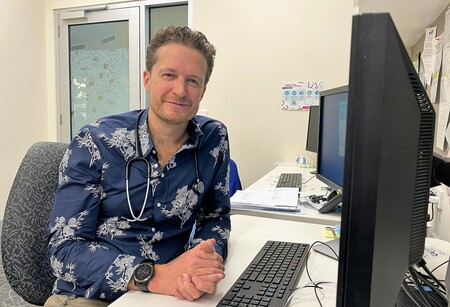Grampians Health part of Australia-first clinical trial into treatment for preschool wheeze

Following International Clinical Trials Day (20 May), Grampians Health reflecting on the more than 90 clinical trials the teams are currently participating in, including a world-first trial for treating preschool wheeze in Australia and New Zealand.
Dr David Tickell, Consultant Paediatrician at Grampians Health is currently leading the Assessing the Reduction of Recurrent admissions using OM-85 for the treatment of preschool Wheeze trial in Ballarat, which is known by the acronym ARROW. Managed by the Children’s Inpatient Research Collaboration of Australia and New Zealand (CIRCAN), the clinical trial is a multi-centre, randomised, double-blind, placebo-controlled trial, spanning over 35 hospitals across Australia and New Zealand.
OM-85 is made from molecules extracted from the walls of bacteria, which is delivered via capsule and is designed to stimulate the lymph glands in the upper intestine. With studies already conducted in Europe showing the effectiveness of OM-85 in treating preschool wheeze, Dr Tickell hopes this study will "validate what has been seen in European studies" for Australian children.
"The safety profile of OM-85 is excellent throughout the world; it has a long safety history, what it doesn't have is any research base in Australia, so this is the first trial in Australia, which is fantastic," Dr Tickell said.
Preschool wheeze is different to Asthma and can be brought on by any other respiratory illness in children aged 1 to 5 years.
"Preschool wheeze is an inflammatory response to the virus itself, whereas asthma is an allergic response in the smooth muscle of the lung. So any respiratory viral illness can cause wheeze, and there are over 30 of these illnesses that may cause viral wheeze in children," Dr Tickell said.
Grampians Health is a recruitment site, with Dr Tickell working with families whose children have been admitted for preschool wheeze, and have had previous wheezing episodes, to have them as part of the study.
Once children have been recruited to the study, CIRCAN will send either the treatment or placebo to families, and monitor with phone calls, with Dr Tickell available to families if he’s needed. The study is a placebo-controlled, double-blind, randomised trial, which means the families, their doctors and CIRCAN will not know if they are receiving the drug or the placebo.
“It's a disease process that puts a lot of kids in hospital, not usually severely unwell, but it's putting a lot of kids in hospital, so if you can manage preschool wheeze easily at home, it's going to reduce hospital burden," Dr Tickell said.
While it's not a standard therapy worldwide, Dr Tickell hopes that it become part of the options available for doctors to help their patients reduce the severity of the illness.
"The trial's aim is to reduce rates of wheezing illness, including hospitalisation, but I think that given the size and breadth of this study - being across so many different environmental situations - it will provide even more evidence worldwide that it could become more mainstream in terms of adjunctive care for viral wheeze.
"If you look at the rates of preschool wheeze in Ballarat compared to northern Queensland, we have far greater rates here just because there's a higher viral burden, so I think that showing that we can reduce the rates across different environmental areas in such a broad study will allow us to not only change the way it's done in Australia, but worldwide too," Dr Tickell said.
You can find out more about our clinical trials and Clinical Trials Day via bhs.org.au/research
About Clinical Trials Day:
International Clinical Trials Day is held annually on 20 May, the day that is widely recognised as the day James Lind started his study of how to prevent scurvy in 1747.
While serving as ship's surgeon on the HMS Salisbury, Lind gathered 12 men and grouped them into pairs. They were given a variety of dietary supplements from cider and vinegar, to oranges and lemons. Although the trial only lasted a short time - about six days when the oranges and lemons ran out - there was noticeable improvement in the group eating fruit. This gave Lind evidence of a link between fruit and preventing scurvy.
While research and clinical trials is much more regulated and safer than it was in the 1700s, it's still an important resource for our medical professionals to keep us all as healthy as possible. Grampians Health runs and is part of clinical trials with the goal to keep finding the best treatment options for patients, now and into the future.

